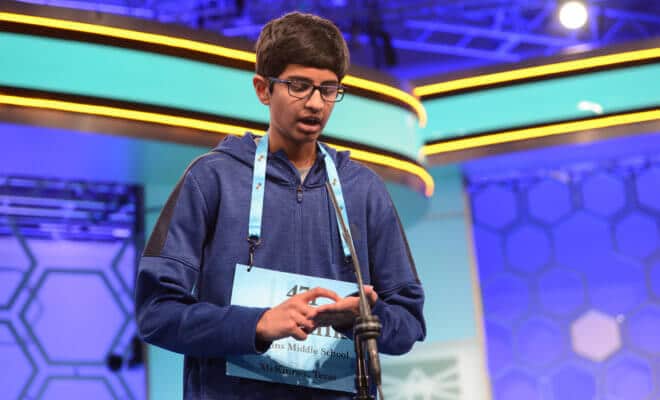Life
Why Have So Many South Asian Americans Won the Spelling Bee?

Karthik Nemmani, a Texas eighth grader, winner of the 2018 Scripps National Spelling Bee!
Photo: Scripps National Spelling Bee. CC by 2.0
Balu Natarajan correctly spelled the word “milieu” to win the Scripps National Spelling Bee in 1985. He was the first South Asian-American to do so. Three years later, Rageshree Ramachandran seized the title with the word “elegiacal.” And this week, Karthik Nemmani became the 11th straight South Asian-American to win the bee. His word: “koinonia,” which means an intimate spiritual or Christian communion.
Even as the spelling bee’s words seem to have grown tougher, something else has stayed fairly consistent: 19 of the last 23 winners have been of South Asian descent.
A recently released film, “Breaking the Bee,” tackled the question: Why have so many South Asian-Americans won the spelling bee? In an interview, Sam Rega, the filmmaker, offered several theories. The interview has been edited and condensed.
Q: What was the starting point for South Asian-American success at spelling bees?
A: The 1965 Immigration Act. This act lifted race-based quotas about who could come and not come into the United States. Subsequently, there was an influx of highly educated immigrants, especially from India, coming into the U.S. These families had a strong focus on education and raised their kids to also value education.
Q: What role did Balu Natarajan’s win in 1985 play in this phenomenon?
A: It was the first time people from the community saw a South Asian kid on screen. Kids thought, “If he can do it, I can do it. Our families are from the same place. He looks like me.”
Newspapers covered his win. This was a key moment. A headline like that on the front page of newspapers meant a lot to the community.
In recent years, I’ve heard kids describe past winners as role models, like you might hear a young kid say they want to play like Michael Jordan. ESPN’s decision to broadcast the bee starting in 1994, the 2002 Academy Award-nominated film “Spellbound” — all raised the profile of spelling in the South Asian community and made more kids want to participate.
Q: Is there something about South Asian values or families that explains success in spelling?
A: To me, the key is how much these families believe in the idea of family. And how much spelling is a family sport. They believe in working together as a family unit. They want to create a bond between parent and child. Spellers look to their parents as role models and coaches. Their siblings often play assistant coach. Parents like to instill values like dedication, hard work, and how to handle yourself in defeat or success.
These families also tend to be multilingual, sometimes with moms and dads who speak different languages. Exposure to multiple languages can also play a role in spellers’ facility with spelling. Spelling is a worldly sport, it connects you to languages and places far away from you.
Q: Are there groups that help children compete in this sport?
A: Yes, there are organizations like the North South Foundation, which started in the late 1980s to help kids succeed academically in the U.S. In the early 1990s, they started hosting academic competitions like spelling bees. They focus on helping spellers prepare for the national competition. They’ll even stop in the middle of a bee, and give guidance like, “speak a little louder, ask this question, or that question.”
Since 2008, there’s also been a South Asian Spelling Bee. Which, coincidentally, is also the beginning of the 11-year streak of South Asian winners of the national bee.
Q: Is there a downside to focusing on spelling in the South Asian community?
A: No, I think these families know what sacrifices they’re making. These kids could have more vacation or more time to play with friends, sure, but most families I met try to strike a healthy balance. To be driven and focused on something requires sacrifice, whether you’re a speller or a basketball player or a musician.
© 2018 New York Times News Service
